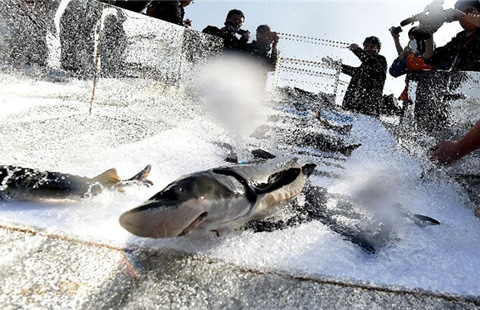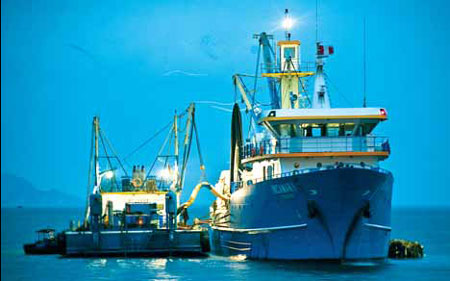Fisheries sector reels in foreign investors
Updated: 2012-05-24 08:12
(China Daily)
|
|||||||||||
|
Blessed with incredible marine life, Peru's extensive waters are among the richest in the world for fish and mollusks. |
Blessed with rich marine life, Peru boasts the second largest fishing industry in the world
Given its strategic geographical location and favorable climate, Peru is a leading source and exporter of fish and fish-related products to countries around the world, including China, with several deep-sea fishing companies competing for precious catches.
Home to several hundred species of fish, Peru's nutrient-rich waters teem with high-value species like sea bass, mackerel, tuna, herring, anchoveta and other marine life such as crab, lobster and mollusks. While the warm ocean current known as "El Nio" occasionally negatively impacts the industry, the sector is a major employer and key source of foreign exchange revenues.
According to government data, the fisheries industry generates around 10 percent of GDP. Exports for 2011 reached nearly $1.05 billion, of which about $412 million came from sales of frozen giant squid.
A report published in 2010 by the Food and Agriculture Organization of the United Nations confirms Peru as the second largest marine and inland capture fisheries industry in the world at 7.4 million tons.
That figure was exactly half of the 14.8 million tons caught by global leader China. Canned fish and frozen fish are among its most popular exports.
The traditional and important industry is regulated by the Ministry of Production and supported by the Peruvian Institute of the Sea.
PRODUCE's regulatory framework includes the setting of the quota catch system and implementation of temporary bans to ensure natural resources have sufficient time to recover and replenish.
"Peru is a leading fishery country and is the second in the world in terms of fish landings and the foremost exporter of fishmeal," said Peru's Private Investment Promotion Agency.
"This is because of the high yield and the nutrient rich waters of the Peruvian sea, the existing diversity of species and the leadership of national and international enterprises with operations in the country," he said.
The Peruvian fishery sector is keen to develop new products that achieve higher prices in the global marketplace, added ProInversin, before highlighting some of the many investment opportunities available in areas such as fleet replacement, cold chain, processing, logistics and aquaculture.
"In the fishmeal and fish oil fields, there are possibilities to invest in new plants for prime fishmeal production, which sell at a higher price. There are diverse projects for developing aquaculture of high-value species, based on the available fishmeal," said Eduardo McBride, president of the Peru-China Chamber of Commerce.

"The private sector is making significant investments, particularly in frozen and canned seafood products. Special presentations with specific sauces or spices are also being developed to meet growing demand from around the world," he said.
He also noted, "with China preparing to invest around $10 billion in Peru over the next five years, sectors like fisheries and manufacturing offer investors huge potential.
"China is projecting that 60 percent of its total global investments are going to be directed towards Latin America by 2020," he disclosed.
"Chinese investment in Peru has traditionally focused on mining and hydrocarbons but the current trend shows China betting on Peruvian manufactured products and high technology," he said.
Peruvian Prime Minister, Oscar Valds, said such substantial foreign investment will help reduce extreme poverty through the creation of employment opportunities and higher tax revenue. He urged investors to focus on areas outside of the mining industry, such as forestry, fisheries and tourism.
"We are blessed to have such great natural resources and we now have to develop these without harming the environment and learn how to make better use of our ocean and vast resources."
Efficient suppliers
Established in 1976 through the acquisition of a fishing vessel called Cuzco 4, Pesquera Exalmar S.A.A. has grown into one of the leading commercial fishing companies in Peru. The company produces around 15 percent of the country's fishmeal and fish oil and is focused on long-term sustainability.
The company, which has a sister firm focused on agricultural products like asparagus and grapes, strives to be "recognized worldwide as the most efficient supplier of high protein hydro-biological products and provide customers quality, eco-efficiently prepared products, based on constant innovation and the working capacity of its staff".
Pesquera Exalmar's activities center on the extraction, transformation and commerce of natural marine resources for indirect human consumption like fishmeal and fish oil, as well as direct human consumption products such as fresh seafood.
Over the past few years, the company has made several acquisitions and now operates 24 vessels and five processing plants that are strategically located along the coast.
As a result of this successful expansion drive, the firm holds around 10 percent of all fishing quotas in Peru. In November 2010, Pesquera Exalmar listed on the Lima Stock Exchange in a share issue that raised more than $90 million.
"We are a very creative and dynamic company that has developed our business professionally and sees the opportunities our country's geography presents, while always being aware of our responsibility to the environment," said Pesquera Exalmar CEO, Rossana Ortiz.
"Peru has many opportunities in the mining sector, the fishing sector, and other industries. In the fishing sector, China is a good destination for fishmeal, fish oil and other aquaculture products.
Asia's food culture is linked to the sea and one of Peru's big strengths is the sea, so there is great potential and optimism for trade with regard to this sector."
As part of its investment drive, Pesquera Exalmar recently launched a new business unit focused on direct human consumption products, which included the construction of new plants in northern and southern Peru to process catches.
In addition, several large vessels were fitted with modern refrigerated sea water systems to guarantee catch preservation. Fresh fish for direct human consumption are aimed at major markets in Europe, Africa and China.
"We have a processing plant at Paita in the northern region of Piura which freezes seafood for direct human consumption," continued Ortiz. "We chose Paita as many species abound there, such as mollusks, prawns, cuttlefish - a squid that is super popular in China and Asia - and the mahi-mahi, a fish that is very easy to digest. We constructed another plant at Ica in the south because there are a lot of cuttlefish there, as well as jack mackerel, mackerel and hake."
"China has a huge population that needs to eat and we provide a product they need. Fishmeal is very important to the Chinese because it is what their pigs eat and the only substitute is milk which is much more expensive."
Following the injection of capital in late 2010, Pesquera Exalmar is seeking to obtain more fishing quotas and "studying other acquisitions", Ortiz added.
"Another segment (where we can invest) is fish farming China is going to continue growing and demand for aquaculture and Omega 3 fish oil will continue to increase."
Offshore innovation

Founded less than a decade ago, TASA is currently the largest producer of fishmeal and fish oil on a global level , thanks to its fleet of 50 fishing vessels — equipped with state of the art electronic equipment — and 13 modern plants strategically located along the Peruvian coast.
With a focus on quality not quantity, TASA excels in the extraction, transformation and trading of hydrobiological resources for direct and indirect human consumption. It also offers shipyard services for the construction, maintenance and repair of vessels and marine instruments.
Since TASA operates in the marine area, it is concerned with exhaustive compliance with the environmental norms to assure that it does not damage the ecosystem. For this it applies a fishing management and industrial management model that is exemplary because of its eco-efficiency and respect for biodiversity.
By the end of 2012, it will have reconverted all of its plants for the use of clean technologies under the "Steam Dried" system; additionally, 14 of its vessels have modern refrigeration systems which guarantee an optimum supply for human consumption.
Carlos Pinillos, CEO of TASA, stated the firm's success is due to a combination of factors, the most important being its long term strategic proposal.
"We proposed what we wanted to be, what we intended to achieve and all we did was think of how it would be executed and allocate the tools to achieve that" he explained."One of the first principles outlined was to have a processing plant every 200 kilometers, for the purpose of being close to the catch zone, being able to deliver the fish to the port as soon as possible and thus be more efficient.
"TASA has always bet on the quality of its products; for that reason, it has never put production volumes before that. This has led us to stand out and position ourselves all along the coast of Peru. We also have the capacity to innovate and provide the world with high quality marine foods and ingredients.
"We believe that in the future, the increase in exports of fish oil will be the result of the Chinese population being more aware ofthe benefits of Omega 3. Many countries have realized the advantages of this compound, not only in nutrition, but also in the prevention of illnesses and, subsequently, the important savings in health matters."
TASA has strengthens its identity as an innovating, eco-efficient and socially responsible company by receiving four distinctions in 2011 from prestigious Peruvian entities such as the Ministry of the Environment, the Ministry of Foreign Trade and Tourism, the Peruvian University of Applied Sciences and the Association Peru 2021.
InFocus provided the story
(China Daily 05/24/2012 page7)
Hot Topics
Editor's Picks

|

|

|

|

|

|








